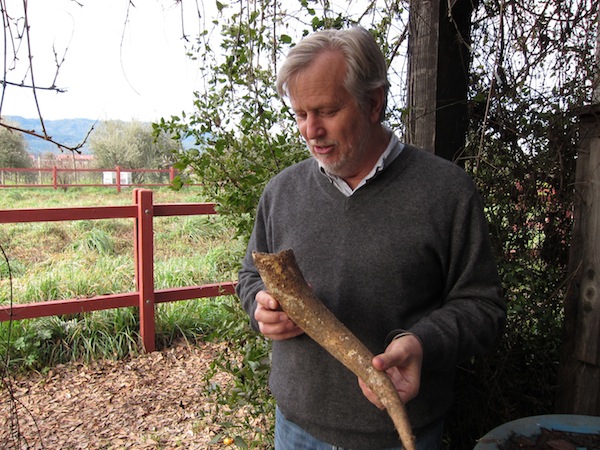Sokol Blosser Pinot Noir and braised veal cheeks with smoked mushrooms
 |
| Susan Sokol Blosser. |
Susan Sokol Blosser is not a famous winemaker. In fact, in 1990 when her former husband, Bill Blosser, extricated himself from the Sokol Blosser Vineyard & Winery that they founded together in 1971, she took over the operations with the experience of just running the tasting room, doing the books, and, as she once candidly revealed, never having “grown anything but a sweet potato in the glass” (Reed Magazine’s Alumni Profiles, Spring 2007).
But she quickly found grape growing already in her as a dormant gene; despite the fact, says she, that “I could never have imagined that I would develop such a deep connection to the land… I could have lived my whole life in the city and never known.”
What Susan Sokol Blosser is now famously recognized for is being one of the driving forces behind the Oregon wine industry’s green movement. She not only began implementing sustainable grape growing practices in quite visible fashion, she built an underground barrel cellar to U.S. Green Building Council standards, and Sokol Blosser became the first winery in the U.S. to earn the prestigious LEED (Leadership in Energy and Environmental Design) certification.
In 2005 Sokol Blosser also received full accreditation from Oregon Tilth, a third party certifying organic farming according to USDA standards; and Sokol Blosser’s home vineyard in Dundee Hills – the historic heart and soul of Oregon’s Willamette Valley – was also certified by Salmon-Safe, recognizing farms taking pro-active steps to protect and restore salmon habitats.
Today Sokol Blosser is exploring biodynamic practices because, she explains, “I want to understand the part we play in the ecosystem.” Part and parcel of the estate’s green commitment, however, has been a steady movement towards finer and finer wines, especially since the arrival of winemaker Russ Rosner in 1998; plus the renewed energy supplied by the Sokol Blosser kids, Alison and Alex, who have recently taken over the management as co-presidents. Up until recently, Sokol Blosser has been known mostly for Susan’s brainstorm proprietary white wine, called Evolution (formerly known as Evolution #9); a fun, soft, frankly fruity, musk scented blend of as many as nine grape varieties.
But in recent vintages, Sokol Blosser’s reputation for the state’s spécialité, Pinot Noir, has also solidified; as evidenced the winery’s current release, the 2006 Sokol Blosser Dundee Hills Pinot Noir (about $36): beginning with a transparent brick ruby indicating a focus on purity of natural, organic fruit rather than a giving into the temptation to over-extract grape skin phenolics and pigmentation in the winery; followed by beautifully ripened, red berry/black cherry fragrances tinged with cinnamon-mocha coffee spices; a teasing taste of piquant dried cherry at the tip of the tongue, preceding sensations of rounded but firm, moderate tannin in the middle, and a continuation of the dried berry/cherry fruit qualities merging with bottom notes of earthy, dried forest leaf-like flavors into a zesty, almost sweet finish.
 |
| Sokol Blosser winery and estate. |
A good wine, said Shakespeare, needs no bush, but it sure as heck tastes great with a well thought-out food match. There’s an umami-like quality to organically grown Pinot Noirs that makes them the best possible wines for any braised meat; especially since the liquids in braises reduce into umami-rich complexities.
I once heard beef cheeks described as “excruciatingly tender,” and this sinewy, boneless part of the cow is indeed like that when slow cooked until the collagen in the muscles breaks down into a gelatinous jus. In this recipe for braised veal cheeks with smoked mushrooms, the aromatic mirepoix of onions, carrots and celery fuse with red wine, fats and proteins to create the kind of velvety, earthy meatiness that velvety Pinot Noirs seem made for; with the smoky, earthy qualities of the mushrooms accentuating the organic qualities of the Sokol Blosser even further.
Oregon has evolved into one of the world’s leaders in organic viticulture and responsible winemaking, due in no small part to the inspiring leadership of Susan Sokol Blosser.





Comments
Post a Comment